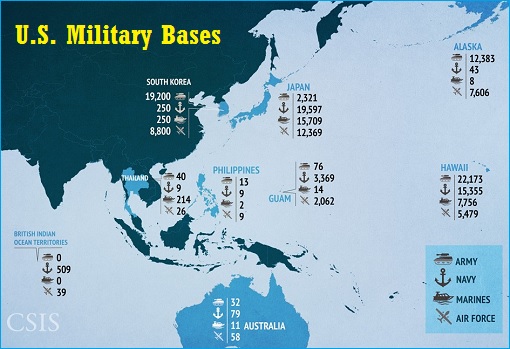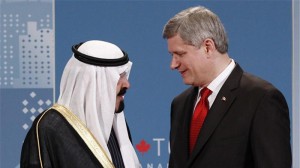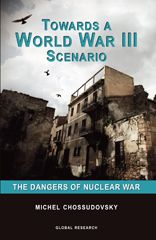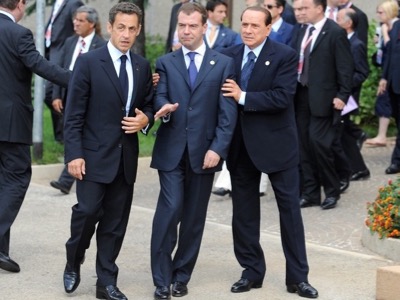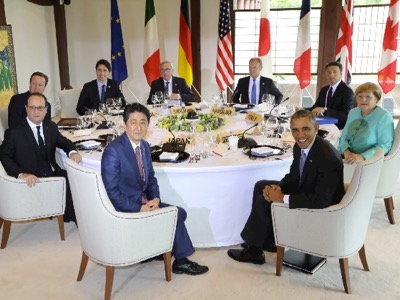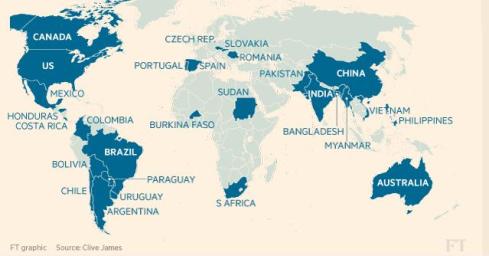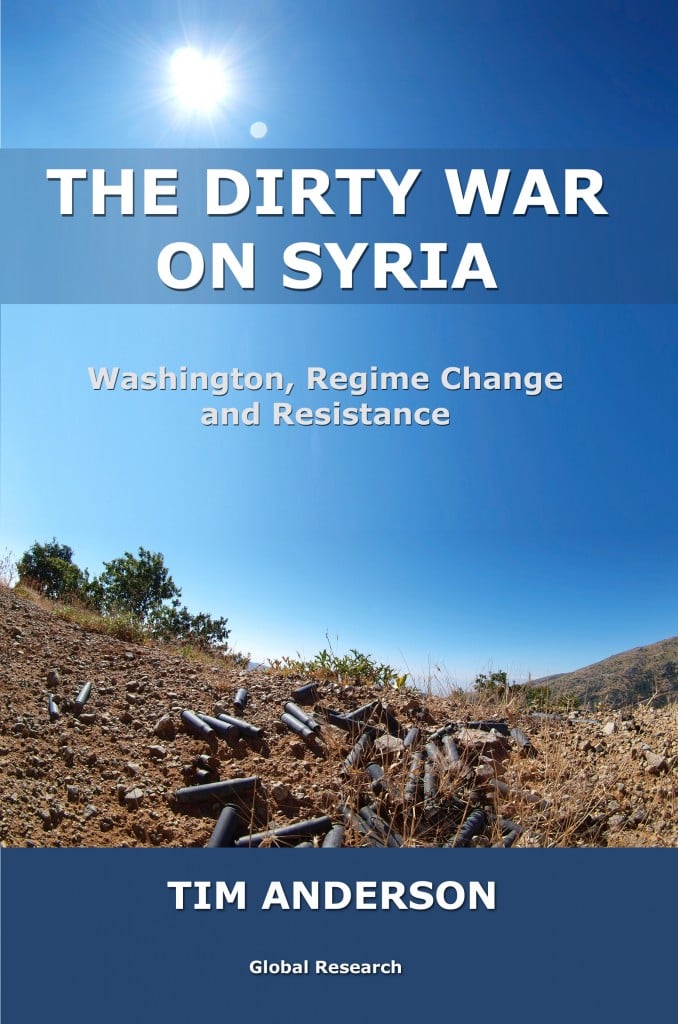Professor James Petras
What does it mean when the US and British financial systems launder hundreds of billions of dollars of illicit funds stolen by world leaders while their governments turn a ‘blind eye’, and yet the very same Anglo-American officials investigate, prosecute, fine and arrest officials from rival governments, rival banks and political leaders for corruption?
What does it mean when the US government expands a world-wide network of nuclear missiles on bases stretching from Poland, Bulgaria, Romania, the Gulf States to Japan, surrounding Russia, Iran and China, while the very same US and NATO officials investigate and condemn rival defense officials from Russia, China and Iran, as military threats to peace and stability?
What does it mean when Anglo-American economic officials devote decades to raising the age of retirement, reducing working and middle class household income, cutting workers compensation, expanding part-time work, setting the stage for mass layoffs slashing unemployment and health benefits and reducing social spending by the hundreds of billions of dollars and then turn around and investigate and threaten rival countries, like China and Argentina with loss of markets, investment and employment for not doing the same thing ?
The meaning of Anglo-America’s long-term, large-scale structural regression is clearly evident across the world. From Europe to Latin America and from Asia to Africa, socio-economic and politico-military agendas have been reversed.
Since the end of the Second World War there had been incremental gains in labor rights, stable employment, poverty reduction and working conditions.
Recently, these have all been reversed: Longer working days and weeks with reduced salaries and benefits; unstable temporary work replaces stable employment; employer-funded pensions are eliminated and replaced by multi-billion dollar corporate tax cuts and off-shore tax evasion.
Systematic structural swindles by the leading financial institutions have forced employees to delay retirement for years in order to ‘self-finance’ their own meager ‘pensions’, some expecting to ‘die at the job’.
Capitalist regression has been implemented by arbitrary state dictates and authoritarian decrees, erasing any pretense of democratic procedures and constitutional laws.
The regressive and retrograde leader-states from the imperial centers impose their conditions on follower regimes like Mexico and Russia forcing them to reverse their legacy of social progress while blackmailing these regimes’ oligarchs with the loss of lucrative markets, access to tax and money-laundering havens and impunity for their crimes and swindles.
Anglo-America: Historic Reversion
For the past three decades, the US and Great Britain have led the global drive to undermine labor’s advances. First, the economic structure sustaining labor organizations were dismantled and fragmented. Then organized labor was decimated, co-opted and corporatized.
Capital proceeded to reverse labor and social welfare legislation and lower wages, in order to impose longer workdays and destabilize employment.
The mass media re-packaged the regression cycle as ‘economic reform’, a euphemism, which disguised the re-concentration of power, wealth and income over the last three decades.
The growth of inequality and the concentration of wealth and assets to the 1% became ‘the standard’ for the Anglo-American era. However, class organization and the vicissitudes of class struggles continued to constrain efforts to impose unchallenged Anglo-American capitalist rulership throughout the world.
The first decisive blow against social reform resulted from the systematic Anglo-American breakdown of the former USSR and allied nations of the Warsaw Pact in East Europe. This was followed by the endogenous dissolution of Communist Party rule in China, Russia, Eastern Europe, the Baltic and Balkan states and their conversion into capitalist satellites. Social welfare, full employment, public pensions and health systems were shredded; labor lost all its rights except one – the right to emigrate to the West as cheap labor.
From Russia to Latvia and Poland to Bulgaria and Romania, there were massive layoffs, plant closures and the total dissolution of social security networks driven by the Anglo-America neo-liberal onslaught. The Atlantic Alliance brought their new Eastern satellites to social submission.
Until the second decade of the 21st century, Western Europe’s centers for the defense of the progressive social agenda were in France, Italy, Spain, Greece and Portugal. The social agenda in Latin America and China faced the Anglo-America offensive even earlier.
France: The Strategic Key to Anglo-American Social Regression
France has been the center where the Anglo-American regressive attack on socio-economic policy and Southern Europe’s resistance has been playing out.
By 2015 the regressive alliance had overturned all progressive social policy in the former communist bloc countries. Their alliance with Germany’s finance sector give them tight control of the EU and they successfully decimated the progressive social programs and labor legislation in Greece, Spain and Portugal.
France became the centerpiece for Western capitalism’s drive to incorporate Italy into the regressive orbit. The conquest of France and Italy would completely reverse 70 years of incremental labor gains after the defeat of fascist capitalism.
The assault on France’s progressive social agenda is spearheaded by the retro-Socialist President Francois Hollande and his troika of authoritarian hyper-capitalist ministers: Financial Minister Michel Sapin, Prime Minister Manuel Valls and Economy Minister Emmanuel Macron.
The strategy of relying on a ‘nominal socialist’ to destroy the social welfare state is a classic ‘Trojan Horse’ operation. Hollande’s virulent anti-labor policy is implemented by decree under a joint plan developed in association with France’s leading industrialists.
The imposition of the regressive policy in France began in stages. It first established the retrograde political leadership with Valls, a notorious authoritarian police-state official willing to over-ride any democratic niceties. The Economy Minister, Emanuel Macron, a millionaire investment banker, is a direct associate of the financial elite, with no qualms in slashing labor programs. The Finance Minister Michel Sapin, a long-time accomplice of the French bureaucratic-capitalist elite, is prepared to slash pensions and public services while reducing job security in order to lower the cost of labor to capital.
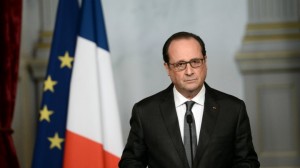 Once the Hollande and his troika took control of the centers of political power, (and after militarizing French society in response to the terrorist attacks), the regime launched its anti-labor offensive to shred the progressive social agenda. Its first target was its most formidable – the mass of the French working class.
Once the Hollande and his troika took control of the centers of political power, (and after militarizing French society in response to the terrorist attacks), the regime launched its anti-labor offensive to shred the progressive social agenda. Its first target was its most formidable – the mass of the French working class.
Declaring ‘anti-ISIS’ martial law powers, Hollande adopted an outright authoritarian strategy, bypassing the elected French Parliament in the legislature and imposed ‘rule by decree’ with the announcement of a highly regressive labor law against the French people.
The dictatorial labor decree was a first step to weaken organized labor’s capacity to protect wages and job security in order to give a powerful impetus to employer control over the French labor force.
Once Hollande’s labor decree established capitalist supremacy, his Troika would be in a decisive position to reverse seventy of incremental social advances.
The joint Hollande-Troika-capitalist bloc emasculated the legislature, leaving a weak, bleating chorus of so-called ‘left Socialists’ to bemoan their political impotence. Then an entirely new business anti-labor code was rolled out, which included the right of bosses to hire and fire workers at will, extend the workday , lengthen the work week, undermine labor’s bargaining power and restrain strikes and job actions. This would open the way for a wave of irregular and contingent jobs for new workers . . . Using the pretext of terrorist attacks, the French capitalist class had begun to rule by decree to further expand and deepen their long planned assault on labor.
Hollande’s troika and France’s capitalists are lowering corporate taxes and employer contribution to social payments. Regulations that restrained the concentration of elite power were eliminated.
With curfews and ‘anti-terrorist’ militarized police in the streets, French business elite could now freely begin to to imitate the Anglo-American capitalist elite and impose an iron-fisted New Order.
Without labor constraints on French capital, the bosses are is free to relocate factories and investments any and everywhere, under the most favorable wage, tax, employment and environmental conditions.
No longer required to invest in French industry, the business elite can transfer capital from industry to financial sectors, allowing hundreds of billions of euros to be laundered in off shore tax havens.
The Hollande troika will now also establish its own version of ‘Security and Exchange investigators’ to prosecute and fine its rival Anglo-American financial swindlers, just as the Anglo-Americans pursue their French competitors today.
The Hollande regime’s regressive social agenda has opened the door for an even more extreme Presidential prototype to follow and Alain Juppe is waiting.
The rabid Republican Party presidential candidate, Alain Juppe, promises to go ‘whole hog’ in utterly destroying the French welfare state, as it has existed since the fall of fascism. If elected president, Juppe promised to slash 100 billion euros from the budget – double the amount that the Hollande regime currently seeks to cut. Juppe has pledged to eliminate 250,000 civil service jobs in all vital social sectors; to delay the retirement age from 62 to 65; eliminate the 35-hour workweek; facilitate worker layoffs and decimate unemployment benefits. Finally, Juppe has promised French capital that he would implement their entire business agenda, cut taxes for business and bankers and eliminate the tax on inheritance implemented nearly four decades ago.
In other words, the Hollande regime’s assault on labor and embrace of business has opened the door for the rise of the extreme right. Moreover, Hollande has manipulated the incidents of Islamist terrorism to assume arbitrary decree powers wiping out any pretense of a democratic government. The terrorist incidents are arguably related to Hollande’s colonialist embrace of the ‘regime change’ assaults against the secular nationalist governments of Libya and Syria and his policy of sending (or tolerating the recruitment of) marginalized French youth of North African ancestry to fight in the ensuing civil wars. This has further strengthened the rise of the extreme right in France.
As the Socialist and Republicans compete for dictatorial powers to serve business’ regressive agenda, the nationalist, protectionist and social reformist policies of the National Front are emerging as the populist alternative in the coming presidential race. Anti-fascist rhetoric has worn thin and important sectors of the working class will turn to the National Front in defense of their jobs and social legislation. The anti-immigration rhetoric of the National Front is now part of the political vocabulary of the Republicans as well as Prime Minister Valls.
The only alternative to a power grab by the French hard right is a mass general strike and sustained street battles in order to resist the reaction by decree.
As throughout history, popular struggles in France begin in the streets – among the trade unions and young workers angrily facing low wages, austerity and the grim prospect of ‘permanently’ temporary jobs.
The outcome of the intensifying French labor-capital conflict will have a decisive impact on the future of labor throughout Europe, especially among all Left unionists.
Latin America: The Labor-Capital Showdown
Beyond Europe, the Anglo-American onslaught against labor and the working class resonates most directly in Latin America and to a lesser extent in Asia and Africa.
The first country to fall victim to capital’s attack was Mexico with the implementation of the North America Free Trade Agreement (NAFTA). By the early 1990’s NAFTA had demolished the independent Mexican trade unions, crippled social legislation, eliminated subsidies to small corn farmers, forced peasants into debt, reduced minimum wage, doubled poverty levels and turned the majority of the labor force into landless, indebted, casual workers. On the other hand, NAFTA has been a bottomless source of wealth as capitalists accumulate double and triple digit profits and absolute power to hire and fire employees. Mexico’s government, under Anglo-American capital, has allowed the illicit transfer of hundreds of billions of dollars of Mexican assets to US, English and other overseas banks, which have become immense money-laundering operations. The proximity of Mexican drug cartels to the US banks has facilitated the extension of their networks into the US market. The horrific expansion of drug cartel death squads, linked to Mexico’s political leaders, dates from the 1990’s and the signing of NAFTA. This bloody nexus has consolidated neoliberal political power in Mexico and weakened the possibility of a viable mass electoral alternative.
Anglo-American dominance in Latin America in the 1990’s led to an entire panoply of regressive policies: privatizing and denationalizing the most lucrative natural and state resources, banks and industries; reducing wages and social spending for labor while increasing the concentration of capital. By 2001 however the Anglo-American edifice collapsed throughout South America with the demise of its neo-liberal political leadership.
From Venezuela in 1999, to Argentina in 2002, Brazil 2003, Bolivia 2006 and Ecuador 2007, left and center-left parties capitalized on their mass support and were elected into power. They took advantage of global economic conditions with the rising commodity prices, booming Chinese markets and new regional alliances to fund a variety of progressive social agendas, including increased social expenditures, guaranteed pensions, family allowances, minimum wages, wage increases for public sector and expanded labor rights.
The Anglo-American power elite was in retreat and isolated, but it was far from defeated. They retrenched and prepared to re-mobilize their strategic business, banking and political allies when the opportunity arose. They counter-attacked when global and regional conditions turned unfavorable to the social regimes.
The assault on Latin America was preceded by the Anglo-American neo-liberal take-over of Northern Europe from the 1990’s to the first decade of the 21st century. This was followed by the sweep and grab of the Balkans and Southern Europe. The combined Anglo-American-EU-NATO offensive now seeks to reverse the last social-welfare regimes in Europe: France and Italy with the help of President Hollande and Prime Minister Renzi.
Simultaneously the Anglo-American offensive has been launched throughout Latin America. Their goal is to recover the imperial prerogatives, political power and economic privileges lost during the previous decade. The primary Euro-American target is the ‘golden triangle’, Argentina, Brazil and Venezuela. These countries constitute a global center of immense oil and agro-mineral wealth.
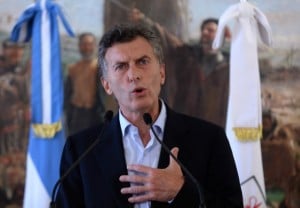 The Argentine neo-liberal restoration took off in December 2015 with the election of far-right President Mauricio Macri (image left). His junta wasted no time in stripping the state of its social legislation, dismantling job security through large-scale layoffs and assuming authoritarian rule by decree to devalue Argentina’s currency by 40% and to eliminate state subsidies and raising the price for gas, electricity, transport, and water between 300 and 800 %.
The Argentine neo-liberal restoration took off in December 2015 with the election of far-right President Mauricio Macri (image left). His junta wasted no time in stripping the state of its social legislation, dismantling job security through large-scale layoffs and assuming authoritarian rule by decree to devalue Argentina’s currency by 40% and to eliminate state subsidies and raising the price for gas, electricity, transport, and water between 300 and 800 %.
The regressive offensive was in full force. Next, Brazil’s twice elected President Dilma Rousseff was ‘impeached’ and essentially overthrown by a bizarre legislative right-wing coup-d’état, designed to reverse a generation of progressive regulatory, labor and employment legislation. It was also secretly designed to halt corruption investigations against many right-wing politicians.
Venezuela is next. It will be the scene of a full-scale-elite coup-d’état with imperial backing, to overthrow the government of President Maduro and end decades of progressive social advances under the Chavista governments.
While in France and Italy, the great social reversal is being implemented by internal enemies from the ‘progressive’ political parties (“Trojan Horses”), in Latin America the reversal is led by openly hostile class enemies who depend on the arbitrary exercise of executive power. The drive to put a definitive end to the ‘welfare state’ in Europe and Latin America is marked by the use of dictatorial decrees, (in the style of Mussolini in the 1920’s) as exercised by Argentina’s elected President Marci in January 2016 and Brazil’s ‘Interim (Coup) President’ Temer in April 2016. Meanwhile capitalist lockouts, hoarding and sabotage are being used to crush Venezuela’s elected government.
This epochal confrontation has spread across Africa and Asia. China’s capitalist offensive has seen a four-fold increase in the number of new billionaires in less than a decade, at the expense of hundreds of millions of workers stripped of their rights and social programs.
South Africa, under the ANC government, turned its back on social gains promised by the liberation struggle and has imposed regressive social legislation and repressive anti-labor decrees. A corrupt class of black and white billionaires now rule by guns and clubs over the black working class.
In Africa and the Middle East, the social welfare states of the nationalist regimes in Iraq and Libya have been completely shredded through imperialist military intervention and civil war. Their once advanced societies have been thrown back into ethno-tribal warfare with no remaining modern social institutions in those two blighted, resource-rich nations.
Wither the Class Struggle: Historical Reversal and Class Revolt?
The Anglo-American offensive to reverse decades of social advance has captured most of Europe. They have incorporated or coopted the Social Democratic parties and are moving swiftly toward dismantling the decade-long center-left welfare states in Latin America.
In Africa, the centerpiece of Anglo-Americanization is South Africa, the continent’s most advanced bastion of international capitalism.
In Asia, China, the second most important capitalist economy in the world, has been leading the struggle to overturn the social agenda of the revolutionary past.
Large-scale, prolonged class resistance in several decisive centers is emerging to confront this Anglo-American process of reversion. The class confrontation however takes specific characteristics in each country.
In France, the major protagonists of street fighting and marches are young unemployed or casual workers, members of the strategic transport and oil unions and student-workers facing a bleak future of marginal employment and a shredded social safety net.
Trade unions and farmers’ association have joined the street struggles on numerous occasions, possibly in preparation for a general strike.
In Latin America, the center of the class struggle is Argentina. Power-mad President Macri immediately imposed regressive policies against all sectors of the working class. His actions managed to unite the four major trade union confederations, multiple retirees associations and small businesspeople bankrupted by exorbitant charges on gas and electrical use and regional neighborhood federations. The widespread growth of job actions among public sector employees points to a general strike.
The regressive assault on long-term social legislation in Brazil immediately followed the thinly disguised capitalist coup. The ousting of President Rousseff has provoked street demonstrations, led by the huge rural landless workers movement (MST), the confederation of industrial and service workers (CUT), social movements of the homeless workers and the recipients of Lula’s poverty programs. New revelations, based on taped conversations among the coup plotters reveal their plans to oust the incumbent President Rousseff in order to derail official investigations into their own corruption scandals. This has enraged the general public.
With the initial take-over, the Brazilian political-financial elite has prepared to launch its full-scale reversal of pensions and employment laws and wage guarantees. The pro-business leadership plans to slash corporate and wealth taxes and to appoint business executives to all leading ministries. The deep corruption scandal and the mass demonstrations suggest the rightwing power grab may not survive.
The regressive offensive in Venezuela has severely crippled the national economy and deeply eroded living standards of the vast majority of the working class. The rightist Congress, backed by the US and allied with international mass media, industry and multinational banks, are trying to force the resignation of Socialist President Maduro.
Maduro has declared a state of emergency and mobilized the armed forces. He called on the military and popular militia to defend the constitutional order and has threatened to mobilize the workers to “take control of the means of production”. Still, the leftist government vacillates over arming the militias and workers. A wide gap remains before the word and the deed.
In the meantime Venezuela’s right wing and left-wing mass mobilizations face each other in the streets seething with class hatred and waiting to engage in a decisive confrontation. The military thus far remains constitutionalist and on the side of the elected president.
 In South Africa, the corrupt pro-business ANC led by President Zuma (image right) murdered dozens of striking mine workers. It has impoverished millions of shantytown residents, while increasing the wealth and power of the black-white elite. On April 30, 2016, 1.1.million South African activists, including civil society and community organizations and trade unions covering the mining, manufacturing and service sectors have organized to form a new confederation linked with informal, unemployed and poor workers. The South African Workers Summit replaces the moribund and corrupt labor confederation, COSATU, the ‘labor desk’ for the neo-liberal ANC regime. The new confederation will co-ordinate mass struggles and reclaim social programs as a central part of the anti-capitalist revolution.
In South Africa, the corrupt pro-business ANC led by President Zuma (image right) murdered dozens of striking mine workers. It has impoverished millions of shantytown residents, while increasing the wealth and power of the black-white elite. On April 30, 2016, 1.1.million South African activists, including civil society and community organizations and trade unions covering the mining, manufacturing and service sectors have organized to form a new confederation linked with informal, unemployed and poor workers. The South African Workers Summit replaces the moribund and corrupt labor confederation, COSATU, the ‘labor desk’ for the neo-liberal ANC regime. The new confederation will co-ordinate mass struggles and reclaim social programs as a central part of the anti-capitalist revolution.
In China, the growth and consolidation of the world’s second largest concentration of billionaires has led to the proliferation of large-scale industrial workers’ strikes, walkouts and confrontations with factory bosses, company unions and government officials. China is becoming the epicenter of Asia’s working class struggles. Chinese workers have forced the government to investigate and jail over 200,000 corrupt officials, high and low, and to concede substantial wage increases and social compensation to factory workers. Fearing more social upheaval, China’s billionaires and multi-millionaires have transferred hundreds of billions of dollars of stolen assets abroad in a buying spree of high-end property in the ‘safe’ Anglo-American “heartland” of world reaction.
The continued advance of working class struggles against the public and private oligarchs has forced the Chinese Prime Minister to reform elite privileges and prosecute large-scale banking swindles and illegal seizure of farmland. Especially important, millions of workers have successfully secured double-digit wage increases and the right to legally live in urban/industrial and construction centers.
As it gains momentum, class struggle in China can become the centerpiece for a wider Asian social transformation and a great leap forward to socialist values.
Conclusion
The Anglo-American drive to establish a global regressive social order has pushed billions of workers on five continents into destitution, insecurity and lifelong exploitation. The capitalist world rules by fiat and violence, declaring that social regression and worker repression are the ‘wave of the future’. For the elite, the proper order of the universe is being ‘restored’!
In response, new working class organizations have emerged and engage directly to defend their historic social advances and economic rights.
In the course of defending their past progressive social legacy, the new working class militants can clearly see the imperative to challenge and overthrow the entire political and economic order. From France to Latin America, from China to South Africa, class struggle is defining the present and future of class relations.



